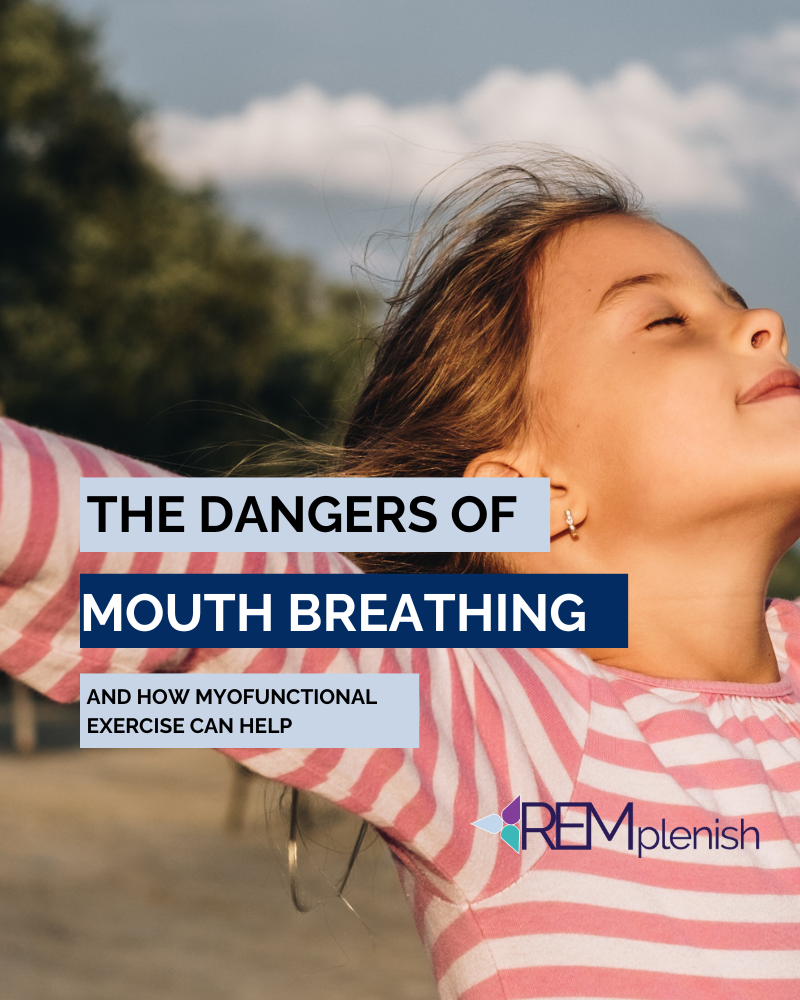What do snoring, jaw pain, brain fog, and restless legs have in common? They could all trace back to your airway.
Could Airway Health Be What You’ve Been Missing All Along?
We tend to think about breathing as automatic—it just happens, right? But the way you breathe, especially when you’re sleeping, can quietly affect your energy, focus, mood, and even your physical development.
Maybe you’ve been waking up tired, dealing with jaw tension, or wondering why your child snores. These might not seem like big issues on their own. But together, they can point to something deeper: poor airway health.
“As a mom and a healthcare professional,” says Patty Reiger, a myofunctional therapist on REMastered Sleep’s team, “I had seen a lot of poor airway symptoms—in patients, in myself, and in my own family. I just accepted that this was as good as it gets. But while taking some continuing education courses, it became apparent to me that breathing and a patent airway are very much connected to overall health.”
In this post, we’ll walk through 12 symptoms that often get brushed off or misattributed—and some surprising health conditions that might actually stem from how well (or not so well) you breathe.
What We Mean by “Airway Health”
Your airway is the path air takes as it moves from your nose and mouth to your lungs. Ideally, it’s clear, stable, and mostly used through your nose.
But many of us—adults and kids alike—struggle with airway restrictions without even knowing it. Whether it’s from allergies, anatomy, muscle weakness, or long-standing habits, an impaired airway can set off a chain reaction: mouth breathing, disrupted sleep, poor oxygenation, and a long list of symptoms you might not expect.
12 Overlooked Symptoms of Poor Airway Health
1. Morning Dry Mouth
You shouldn’t wake up parched. If you do, you’re probably breathing through your mouth at night—often because your nose or airway isn’t doing its job. And it doesn’t take a wide-open mouth; even slightly parted lips can dry you out by morning.
2. Daytime Fatigue That Doesn’t Make Sense
Getting a full eight hours but still exhausted? Shallow or interrupted breathing at night can wreck sleep quality, even if you’re unconscious the whole time.
3. Teeth Grinding or Clenching
Often dismissed as stress, grinding your teeth at night might, in fact, be your body’s way of shifting your jaw to open a tight or restricted airway. And clenching—day or night—can be a subtle sign your muscles are working overtime to stabilize how you breathe.
4. Bad Breath
Dry mouth from chronic mouth breathing allows bacteria to thrive. That funky morning breath may be telling you something.
5. Frequent Sinus Infections
If you’re skipping your nose and going straight to mouth breathing, your body loses its natural filter. That can lead to congestion and repeated infections.
6. Trouble Focusing or Brain Fog
Low oxygen at night = a tired brain during the day. Especially in kids, this can look like inattention or hyperactivity.
7. Forward Head Posture
That so-called “tech neck” posture—jutting your head forward while using your phone or computer—might actually be your body trying to open your airway. Breathing well often starts with alignment.
8. Jaw or Neck Tension
When your breathing is off, the muscles around your airway may tense up to compensate. That tension can radiate up into your jaw and down your shoulders.
9. Voice Changes or Swallowing Issues
If your throat feels tight, your voice sounds different, or swallowing is harder than it used to be, weakened airway muscles may be involved.
10. Snoring in Children
Snoring in kids is never just “cute” or normal. It often signals an underdeveloped airway that could affect their growth, learning, or behavior.
11. TMJ Dysfunction
Clicking, clenching, or jaw pain may be more than a dental issue. Your jaw might be overworking to support a struggling airway.
12. Frequent Nighttime Waking
Waking up multiple times a night, even briefly, can be your brain responding to low oxygen or interrupted breathing.
Surprising Links You Might Not Expect
Restless Leg Syndrome (RLS)
It sounds unrelated, but people with RLS often have fragmented sleep—and that could stem from undiagnosed breathing problems. Poor oxygen levels and disrupted sleep cycles may prompt the brain to trigger leg movements as a kind of internal alarm. If your legs feel restless at night and you’re also a mouth breather, snorer, or light sleeper, there could be more to the story.
ADHD-Like Symptoms in Kids
Behavioral issues in children, like impulsiveness or trouble focusing, are often chalked up to ADHD (or what many still refer to as ADD). But sleep-disordered breathing can create very similar symptoms. When kids aren’t getting enough oxygen at night, their brains stay in overdrive during the day. Studies show that treating airway issues—like enlarged tonsils or chronic mouth breathing—can significantly improve behavior, focus, and school performance.
Anxiety and Emotional Dysregulation
We all feel off after a bad night’s sleep, but chronic breathing disruptions at night can keep the nervous system stuck in stress mode. Low oxygen and poor sleep quality send signals to the brain that something’s wrong, triggering anxiety or making it harder to manage. Improving how you breathe, especially during sleep, can help the body downshift into a more balanced emotional state.
Jaw and Facial Development
The way a child breathes while growing up can literally shape their face. Chronic mouth breathing and low tongue posture can lead to long, narrow faces, crowded teeth, and underdeveloped jaws. This isn’t just about looks—it can affect speech, eating, and even an individual’s long-term dental and overall health. Supporting nasal breathing early on can help guide healthier development.
Acid Reflux (GERD)
Struggling to breathe properly at night can create pressure imbalances in the chest that actually pull stomach acid upward. If you’ve been treating reflux with diet changes or medication without much success, your airway might be the hidden culprit. Addressing breathing patterns may ease digestive symptoms by reducing nighttime strain.
 What You Can Do Today
What You Can Do Today
Improving airway health doesn’t require an overnight transformation. Start with small shifts:
- Breathe through your nose as much as possible.
- Check your posture, especially while sitting and sleeping.
- Try REMplenish™, our Myo-Nozzle that gently strengthens key muscles while you drink water.
- Explore myofunctional therapy if you think tongue or facial muscles might be contributing.
- Talk to a provider who understands airway health—like an airway-focused dentist, ENT, or sleep specialist.
 Final Thoughts
Final Thoughts
Sometimes, the symptoms we dismiss—like jaw pain, dry mouth, or poor sleep—are actually whispers from our body asking us to pay closer attention to its needs. As Patty explains, people today are increasingly looking to get to the root cause of health issues. “Breathing is fundamental,” she says, “and understanding what airway health means and how we can improve it can literally be life changing!”
Airway health doesn’t just help you breathe better. It supports your brain, your energy, your mood, and your long-term wellness.
And the best part? You don’t have to wait for a diagnosis or a device to get started. Just becoming more aware—and making small, consistent changes—can open up a healthier way of living, one breath at a time.





Leave a comment
This site is protected by hCaptcha and the hCaptcha Privacy Policy and Terms of Service apply.